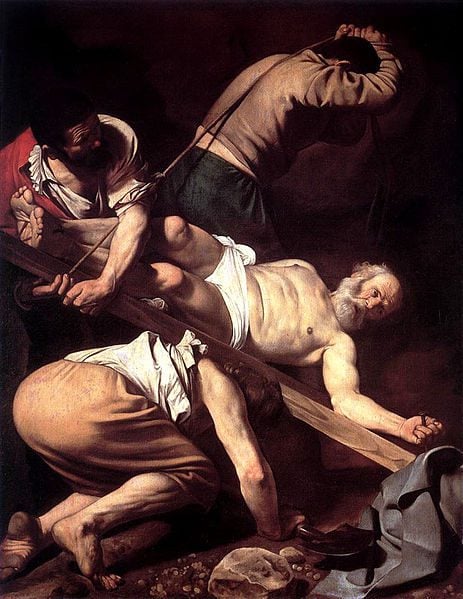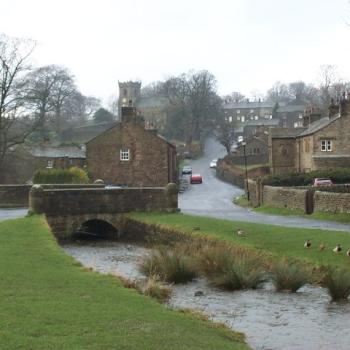
Regarding Acts 3, I simply want to point to three stunning verses from Peter’s impromptu speech to the crowd in the temple at Jerusalem. Their contrast with the scene of the dispirited apostles hiding out on the Saturday between Friday’s Crucifixion and the events of the Resurrection that commenced sometime on Sunday morning could not possibly be any more clear. Something must have happened! Anyway, here they are, in the ESV or English Standard Version:
The God of Abraham, the God of Isaac, and the God of Jacob, the God of our fathers, glorified his servant Jesus, whom you delivered over and denied in the presence of Pilate, when he had decided to release him. 14 But you denied the Holy and Righteous One, and asked for a murderer to be granted to you, 15 and you killed the Author of life, whom God raised from the dead. To this we are witnesses [μάρτυρές]. (3:13-15)
- 3:13 — “The God of Abraham, the God of Isaac, and the God of Jacob, the God of our fathers” — Here, Peter very deliberately invokes the great patriarchs of the Israelite tradition in order to make as strong as possible his accusation, which follows closely hereafter, that, in rejecting Jesus, the Jews had rejected their God and his servant.
- At the conclusion of his speech, at 3:22-25, Peter will likewise invoke the prophets of the Old Testament, and then link them with the patriarchs — and with Jesus. And he will, again, suggest that, in rejecting Jesus, the people of Jerusalem have rejected God’s plan for them and, accordingly, need to repent: “Moses said, ‘The Lord God will raise up for you a prophet like me from your brothers. You shall listen to him in whatever he tells you. And it shall be that every soul who does not listen to that prophet shall be destroyed from the people.’ And all the prophets who have spoken, from Samuel and those who came after him, also proclaimed these days. You are the sons of the prophets and of the covenant that God made with your fathers, saying to Abraham, ‘And in your offspring shall all the families of the earth be blessed.’”
- 3:13 — “his servant Jesus” — I don’t see how anybody reading this phrase can fail to see a distinction between Jesus and “God.” This is not a classical-trinitarian verse.
- 3:13 — “his servant Jesus, whom you delivered over” — Again, Peter boldly casts in the face of his temple-attending Jewish audience the fact that, in rejecting Jesus, they have opposed the God whom they purport to worship. Please note, too, that Peter more or less lets Pilate off the hook, saying that, while the Roman governor “had decided to release [Jesus],” he was persuaded to crucify Christ by the Jews of Jerusalem.
- 3:14 — “you denied the Holy and Righteous One, and asked for a murderer to be granted to you” — Could Peter’s words possibly be any more damning or accusatory? You might think not. But then comes the next verse:
- 3:15 — “you killed the Author of life, whom God raised from the dead” — To have “killed the Author of life” must surely be about the worst sin of which anyone could be accused. And then Peter points to the astonishing divine rebuke, directly on point, that followed that act of life-denying deicide: “God raised [him] from the dead.” They opposed God’s plan, but God defeated their opposition.
- 3:15 — “To this we are witnesses [μάρτυρές].” — Peter takes personal responsibility for the charges that he is making, and includes his companion, John, and perhaps the other apostles as well, in the lodging of the accusation. It’s a bit like the American Founding Fathers putting their signatures to the Declaration of Independence. I can’t help but think of John Hancock’s large and flamboyant signature on the Declaration: A later, apocryphal story has it that Hancock signed his name so largely and clearly with the explanation that he hoped that King George would be able to read it without his spectacles. That story may not be true, but it rather fits Peter’s boldly defiant statement here in Acts 3:15. Something — the Resurrection, perhaps? — has absolutely transformed the cowering apostles of the Saturday before Easter.
- 3:15 — Again, “To this we are witnesses [μάρτυρές].” — The Greek word behind the ESV’s witnesses is martyres. That is, perhaps, not without meaning.
One final observation on the setting of Acts 3:
Now Peter and John were going up to the temple at the hour of prayer, the ninth hour. (3:1)
- This occurs at 3 PM — the count of the hours begins at sunrise, around 6 AM — at the time of the afternoon prayer.
- The fact that Peter and John were attending afternoon prayers in the temple is highly significant: Plainly, the early post-Resurrection Christian movement had not utterly rejected the temple, as some modern Christians maintain.












